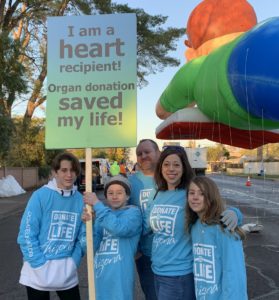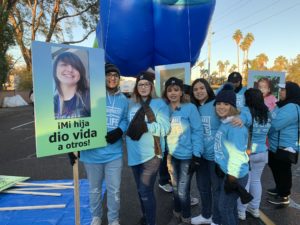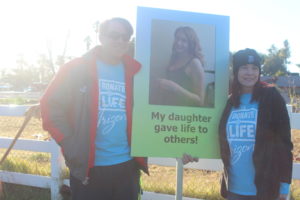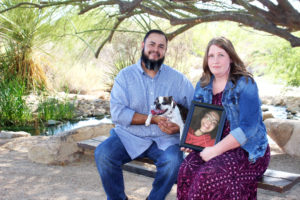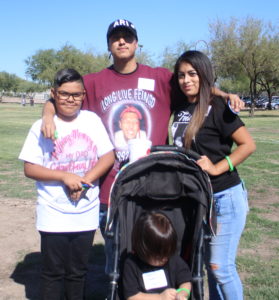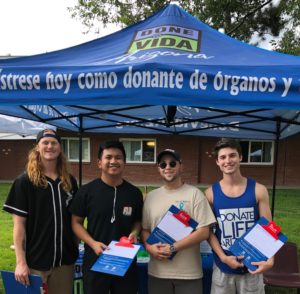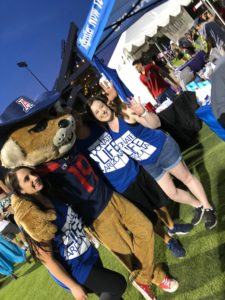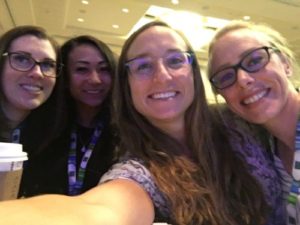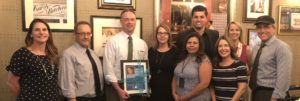Donation during a global pandemic
Organ transplantation is not an elective surgery. It is a life-or-death surgical intervention for people in organ failure. Therefore, the gift of life continues, but the process has changed slightly for organ, eye and tissue recovery, donor risk screenings, and how we have conversations with donor families in an era of social distancing.
Amid the global pandemic, organ procurement organizations across the country, including Donor Network of Arizona (DNA), are working to mitigate the spread of COVID-19, in partnership with hospitals and organ transplant centers, while continuing to make the most of life.
With an understanding of the evolving, unprecedented challenges our community currently faces, DNA’s operations are running 24/7. Below is an overview of some important changes that have been made to minimize the risk of spreading disease while continuing to serve donors, their families and the 112,000 people on the national organ waiting list.
So, what has changed?
First, all authorized potential organ donors are tested for COVID-19 during the evaluation phase of the donation process, even if the potential donor is asymptomatic. That’s because it has not been determined if the virus can be transmitted through organ transplantation, and the Centers for Disease Control and Prevention has warned some people may carry the virus with no chest pain, difficulty breathing or dry cough—three of the most common symptoms of COVID-19.
DNA works with a COVID-19 testing facility in Arizona.
Potential donors who test positive for COVID-19 are not able to donate. If a donor tests positive, we will report that result to the donor hospital and the Arizona Department of Health Services.
DNA is limiting onsite interactions as much as possible. DNA monitors and evaluates potential donation cases via phone calls, remote access to electronic medical records, and through donation conversations with families by phone, when appropriate. As needed during the donation process, DNA staff goes onsite to the hospital following hospital guidance on personal protective equipment (PPE) for safety.
Are there less donors because of COVID-19?
It may be too early to know for sure. There have been more donation deferrals—meaning a potential donor was not able to donate—because of coronavirus risk factors or positive test results. However, recent numbers from March 31, 2020, show the volume of successful organ donation cases has steadily increased in Arizona over the last six months (with the timeframe of the onset of this pandemic included).
If families are not allowed to visit patients, how are you meeting families for donation conversations?
The limitations on family visits in hospitals reduce exposure and ensure safety for all, and DNA supports that measure. But these limitations can be challenging to donation conversations. They affect our ability to meet with families in person and explore this most genuine act of generosity of organ, eye and tissue donation. However, we are meeting the challenge. Sometimes, we can meet with families in the hospital. Other times, we connect with them over the phone. We continue to be amazed at the generosity of those we meet at this time.
DNA has adjusted how to best make a connection with donor families, and we value hospital and family support to have these important conversations.
Like everyone involved in the COVID-19 pandemic, we are learning every day and our processes continue to evolve. We are grateful for the exceptional work performed by DNA and hospital staff to continue organ donation and transplantation, and we remain humbled by donors and their families who choose life in such a time of national crisis.
Reminder: It is National Donate Life Month. While we won’t be seeing you at local events and activities, we’re inviting you to join us as we spread generosity while social distancing. Please visit dnaz.org/spread-generosity-not-germs/ if you’d like to learn more!
Helping Others by Helping Yourself
Now nearly three months into 2020, how many of us have already begun feeling burnt out?
“What have you done for you?” asked Michelle Post to more than 400 attendees at Donor Network of Arizona’s (DNA) 2019 “Illuminate” Donation Symposium last August. Followed by, “What can you do to take care of yourself?” It is not selfish, rather a request to consider how to best prevail. Burnout, vicarious trauma, secondary traumatic stress and compassion fatigue can affect anyone in the donation community.
Compassion fatigue doesn’t discriminate whether someone is a director, an embalmer, an educator, a nurse or anyone else. Lack of self-care as shared by Michelle Post—a licensed marriage and family therapist—can reduce your performance. It may also affect your physical and emotional well being. According to Are You Burning Out Survey, adapted by Post, “83% of U.S. healthcare workers are dealing with serious levels of burnout.”
It is not uncommon to experience symptoms, which include but are not limited to: poor boundaries, cynicism, complaining without solutions, irritability, anger, hopelessness, mundanity or loss of creativity, sadness, fear, guilt, chronic exhaustion, headaches and digestive problems. Some suggestions to combat compassion fatigue are: setting healthy professional and personal boundaries, using occupational support if available, debriefing, venting or writing and exercising certainly counts. Post uses the “PEAK” mantra.
PEAK performance means:
-
P—Present: I am here
-
E—Be Exceptional: I matter
-
A—Having Anxiety Managed: I am courageous
-
K—Kicking Butt: Owning self-care
On days it’s harder to PEAK and make time, it’s more important to focus on self-care. To learn more on the PEAK method and self-care, visit Michelle-Post.com.
Honoring Gift of Life at Fiesta Bowl Parade
Each year, Donate Life Arizona honors all who are touched by the gift of donation at the Fiesta Bowl Parade. Donor families and recipients walk side-by-side in Donate Life Arizona’s parade segment, showcasing the legacies created through organ, eye and tissue donation. Accompanying these touching stories was a giant balloon of Reggie, the Donor Cactus, and a passionate group of dancers who energized the crowd along the streets.
This year, 11-year-old Dylan McQueen was among those holding posters proclaiming his lifesaving gift. At eight months old, Dylan received a heart transplant. This transplant gave him the chance to grow up and go on to win a state championship in wrestling as well as four medals at the 2018 Transplant Games.
His mother says that with the gift of a healthy heart came another gift, “the gift of appreciating every day for what it is.”
In 2017, Graciela Sanchez walked in the Fiesta Bowl Parade with Donate Life Arizona for the first time, and made incredible connections along the way. Her daughter, Karen Hernandez, passed away at 18 years old and made an incredible impact on the world. Short as Karen’s time here was, her compassion continued when she saved and healed 23 people through organ and tissue donation. That compassion manifested in Karen’s heart recipient, whom Graciela met at the parade for the first time. Graciela walked in her daughter’s honor again in 2019, celebrating this renewed life.
Also proudly walking behind the enthusiastic Donate Life Arizona dancers was donor mom Dana Ayers. Dana held a poster honoring her 16-year-old daughter, Hannah Pairrett. Hannah was athletic, charitable and selfless. When she passed away earlier this year, she granted the gift of life to five others.
Every December, we are grateful for the opportunity to gather together and honor our loved ones while also showing support for donation. In these moments, we are able to see the impact that donation has and the true gift that life really is.
A Christmas Miracle
After a nomadic, military-family childhood, Jason Burruel and his parents put down roots in the Valley in 1981, and he started high school.
Fast forward to April 2016—married with two children—Burruel previously had a quadruple bypass, but it wasn’t enough. Doctors said he needed a new heart. The fear of his children growing up without him was a thought Burruel couldn’t bear.
After eight months on the waiting list, taking medication and hoping for a second chance, he got a Christmas miracle. Doctors prepped him for transplantation Christmas Eve 2016.
“It was the greatest gift I could ever be given,” Burruel says. “Even though I don’t know who my donor family is, I cannot say thank you enough. All I can do is take care of my new heart and live life to the fullest. In your honor.”
Following Burruel’s recovery phase post-transplant, he can play golf again, see his children graduate from college and continue to be a father and husband to his family. “Thank you, donor family. I want you to know the decision you made that holiday season changed our lives.”
Giving thanks for the gift of donation
November is a time to gather with loved ones and give thanks. It is also when we reflect on the healing gift of eye donation, as November is also Eye Donation Month.
This year, we celebrate Eye Donation Month by remembering Elijah Perez, a young man who saved lives and gave the gift of sight.
Elijah had a heart of gold—loving animals and children, often seen in pictures with him.
“When he passed, I got messages from his friends, and they all told me they knew Elijah because he helped them through a hard part in their life,” his mother, Crystal Aristizabal, says.
Elijah got his Arizona state ID when he was 17 years old, and he decided to check the box at ADOT MVD to be an organ and tissue donor.
Only one year later, he saved the lives of four people through organ donation.
“He showed his caring heart,” his mom says, saving and healing lives with this simple choice.
While you’re gathering with loved ones this holiday season, take a moment to be grateful for those whose selflessness saves and heals the lives of so many. While you’re at it, encourage your family and friends to register at www.DonateLifeAZ.org/register!
A Celebration of Life
Smiles were shared, stories were told, families embraced, and loved ones were honored on a warm October day at Steele Indian School Park. Marcel Pincince, director of Donor Family and Advocate Services at Donor Network of Arizona, spoke deeply to hundreds of donor families about the power of their love ones’ donation and how special the gift of life truly is. Families decorated “generosity rocks” to later serve in memory of someone they love, or to pass on to someone else as a reminder of the power of kindness.
More than 1,400 people came together Oct. 20, 2019, to honor organ, eye and tissue donors. The Celebration of Life provides an opportunity for families to celebrate their loved ones’ generosity while meeting other donor families, recipients, living donors and Donate Life Arizona volunteers. The family-friendly atmosphere included live music, bounce houses, lawn games, a photo booth, food, a memory garden and more.
Damion Arbizu attended the event with his family to honor his brother. He shared how the event was an incredible opportunity to reflect on family members who leave behind a legacy of generosity with their willingness to give the gift of life.
“This is our first year and we want to take it all in, but also acknowledge people who are going through the same thing,” Arbizu says. “I’m glad to be a part of something like this.”
Arbizu’s brother was generous and kind, always helping those less fortunate. When he passed, he donated tissue and organs, helping to save and heal the lives of others.
“He was the type to see someone who needed help and help them,” Arbizu says. “My brother was a real good person, real caring.”
Many took comfort in dedicating time to reflect on the legacies of these heroes, and share their journey of loss, hope and healing.
Campus Challenge
The sound of excited students filled the hallways of the Sun Devil Fitness complex, in anticipation of what the new semester would bring. School clubs and community organizations shared their stories, ideas, missions and goals with students eager to get involved and make a difference.
Donate Life Arizona hosted a table with free T-shirts and a call for generosity, asking students to register as organ, eye and tissue donors. At four colleges with seven events in August, Campus Challenge resulted in 1,317 new registrations.
Campus Challenge is an annual registration challenge that involves sharing the message of donation and registering college students. For some out-of-state students, this is an opportunity to register in Arizona and learn more about the lifesaving gift of donation.
Arizona State University, Grand Canyon University, Northern Arizona University and University of Arizona participated in this year’s challenge. We appreciate the cooperation of local universities in making these events a success.
Illuminating Hope – Donor Network of Arizona’s 2019 Symposium
In 2012, Traci Cromwell was suffering from a persistent cough that was progressively getting worse. Eventually, doctors told Traci that she had an interstitial lung disease. This meant chronic and progressive pulmonary scarring, but Traci thought she would get a prescription for medication and that everything would be fine.
However, it was not fine. “A few months later, I was carrying my groceries into my house and I couldn’t breathe,” she says. “By 2015, I was on 24-hour-a-day oxygen. I needed help with just about all of my daily activities. It really is no way to live.”
To say the struggle was exhausting for her is an understatement, but she knows it affected her entire family. Her daughters did the grocery shopping for her and her husband stepped in to complete all chores around the house.
“Even walking and talking at the same time became a huge challenge,” Cromwell explains.
In February 2018, she received her hero’s selfless gift of two gently used lungs—her transplantiversary becoming her new symbolic birthday.

Traci now gets to enjoy a full and happy life with her family after receiving the gift of life from a generous donor.
Bringing Light to Donation
Traci highlighted this story with the guests at Donor Network of Arizona’s (DNA) Illuminate 2019 Donation Symposium Aug. 16. The symposium, held every other year, aims to shed light on donation and provide comprehensive education to health care professionals and end-of-life providers.
This year, DNA hosted more than 400 attendees to bring to light the essential topics surrounding donation. Presentations included the recent innovation to maximize the gift of life by accepting Hepatitis C positive organs for recipients without Hepatitis C, as well as a panel of medical professionals who shared how to implement honor walks and donor recognition in hospitals. Guests even participated in a self-care session where they learned how to help themselves manage stress better.
Learning tables highlighted different steps of the donation process, such as registering as a donor, donor referrals, organ, tissue and ocular recovery, hospital coordination and communication, and patient aftercare.
To encourage participation and a little bit of competition, guests won prizes through DNA’s in-app game by submitting fun photos, like who they ate lunch with and our hidden Reggie, the Donor Cactus mascot.
Each year, our collaboration with medical professionals and end-of-life caregivers shows us that we truly shine brighter when we work together.
ADOT MVD Saves Lives Month
Tyler Hedstrom, 17, died by suicide, but his prior decision to be a donor gave many people hope of a restored life through cornea and tissue donation.
While at the Arizona Department of Transportation Motor Vehicle Division (ADOT MVD) getting his license, Tyler Hedstrom checked the box to give the gift of life. His mother, Sheila Hedstrom-Pelger, recalls the moment he made the selfless choice.
“He said, ‘Why, yeah, of course. Why wouldn’t you check this box?’” says Hedstrom-Pelger. “I just remember him saying that, because that’s just how he was. Just checked the box and that was it.”
Hedstrom was a seemingly happy kid, with a talent for drumming and dreams of becoming a rock star. But in July 2017, at just 17 years old, he died by suicide. It came as a shock to his family, particularly his mother, who had no idea the teenager was suffering.
“Now I’m learning he was already full deep in the depression. It just did not show,” says Hedstrom-Pelger. “He was very talented. He was a drummer. He was about to start his senior year of high school. He was just always a good kid.”
Through the tragedy of losing her son, Hedstrom-Pelger finds hope and healing knowing her son changed the lives of numerous people with his generous gifts of donated corneas and tissue. Hedstrom gave many people a second chance at a full life, whether through restored mobility, renewed vision, or reconstructive surgeries for breast cancer patients.
Thanks to a vital partnership, 95% of registrations happen at ADOT MVD. Checking the box is a quick decision that can have an incredible, lasting impact on others. Donor Network of Arizona is grateful for the support of ADOT MVD as we continue to make the most of life through the gift of donation together.
ECHOing the Message of Donation
For 35 years, Danny Eschief worked as a tribal recreation coordinator with the Gila River Indian Community — specifically the Akimel O’Otham group. His daughter, Debbie Eschief, says people were easily drawn to him, and that’s how he was so successful in bringing the community together through sports.
He had a community-first mentality, helping others even after passing.
“We never really talked about organ donation in our Native culture and our traditions,” Debbie says about when she learned her father registered himself. “He just said, ‘If somebody can use it, I rather somebody benefit.’”
Danny’s decision to give others a second chance helped more than 20 people, combining donated skin tissue, bone tissue, corneas and organs.
“I think he would be happy that he was able to help other people,” says Debbie.
ECHO Donate Life is a two-week national outreach effort in July. Its focus is to bring diversity and inclusion to the forefront of organ, tissue and cornea donation and the experience of people touched by these gifts, such as recipients, donors and donor families.
Help us ECHO Donate Life! Register your decision to be a donor at DonateLifeAZ.org.

